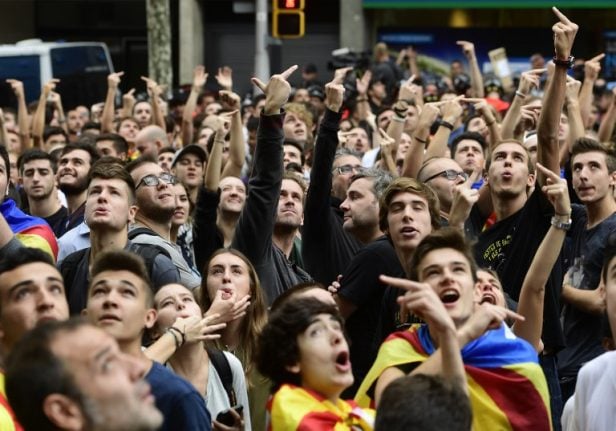- Authorities report that 47 roads have been blocked
- Traffic queues on main highways stretch up to 10km
- Huge demo infront of Popular Party headquarters in Barcelona
A crowd several thousand strong gatherered in front of the Popular Party headquarters in Barcelona chanting “Occupiers Out!”. Similar protests took place outside Cuidadanos party offices in the region.
Ara mateix Girona, davant de la seu de la Generalitat. pic.twitter.com/c4IjJG5D4U
— SER CATALUNYA (@SERCatalunya) October 3, 2017
Public transport services were disrupted as well as port operations, after unions called for the stoppage to “vigorously condemn” the police response to the poll, in which Catalonia's leader said 90 percent of voters backed independence from Spain.
Traffic was cut along some of the main highways in the region, including the toll route AP-7 as people took to the streets to stage demonstrations.
Cutting the highway to protest against the Spanish police violence #3Oct #Democracy https://t.co/PFORlCjKNH
— Isca Viguera (@IscaViguera) October 3, 2017
And some of the main thoroughfares of Barcelona, including Gran Via and Via Laietana have been blocked.
Concentrados ante la Jefatura de Policía ya han cortado la Vía Laietana. Cantan “Els segadors” pic.twitter.com/JZZu2azMzA
— Josep Catà (@jcatafiguls) October 3, 2017
READ MORE:
- AS-IT-HAPPENED: Clashes at polling stations as Catalans vote in referendum
- ANALYSIS: Spanish government crushes Catalan independence dreams – at a high price
- UN calls on Spain to probe referendum violence

Police at a polling station on Sunday. Photo: AFP
Schools and public universities were closed as well as some of the most popular tourist attractions, including the contemporary art museum, football club FC Barcelona and the Sagrada Familia.
The Girona Art Museum adheres to the general strike #3Oct on the occasion of the violence exercised by Spanish government #CatalanReferendum pic.twitter.com/tzTWnOIip2
— Museu Art Girona (@MuseuArtGirona) October 2, 2017
El Prat airport reported that it was functioning normally, with no flight cancellations or delays although few taxis were to be found waiting in the arrivals rank.
“I am convinced that this strike will be widely followed,” Catalan leader Carles Puigdemont said ahead of the protest.
The central government has vowed to stop the wealthy northeastern region, which accounts for a fifth of Spain's GDP, breaking away from Spain and has dismissed Sunday's poll as unconstitutional and a “farce”.
In a statement released late on Sunday, UGT and CCOO, Spain's biggest unions, the Catalan National Assembly (ANC), a powerful pro-independence civil association, and 41 other organisations called for the work stoppage due to “the grave violation of rights and freedoms.”
“We call all society, on employers' organisations, business owners, unions, workers, self-employed workers, institutions and all the citizens of Catalonia to stop the 'country' on Tuesday, October 3,” they wrote.
Minimum services have been established during rush hour (from 6.30am to 9.30am, and from 5pm to 8pm) for subway, bus and train services, in a strike supported by the Catalan regional government.
Thousands of people have gathered this morning in Barcelona and Reus to protest in front of police stations.



 Please whitelist us to continue reading.
Please whitelist us to continue reading.